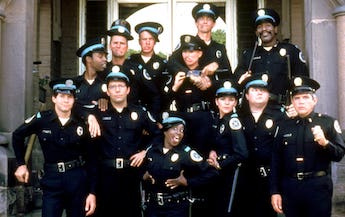The Number One Movie in America: Police Academy
By Sean Collier
December 4, 2020
BoxOfficeProphets.com

1984 was one of the most loaded years in multiplex history, as a string of mega-hits filled screens for much of the year. The top three films that year were “Beverly Hills Cop,” “Ghostbusters” and “Indiana Jones and the Temple of Doom.” “Ghostbusters” won nine summer weekends; “Beverly Hills Cop” was on top for something like four months. “Temple of Doom” broke the record for biggest weekend to date.
Behind those three, however, the hits kept coming. Elsewhere in the top tier of the yearly chart, you’ll find “Gremlins,” “The Karate Kid,” “Purple Rain,” “Footloose,” “Star Trek III,” “Splash” and more.
And, yes, the deliberately goofy comedy “Police Academy.”
In fact, “Police Academy” ranks 6th overall for 1984, outearning the likes of “Footloose” and “Splash.” The slapstick flick earned a total of $81.1 million — north of $200 million in 2020 dollars — and won five separate weekends. It stayed in the Top 10 for 13 weeks (and would’ve lingered longer were it not for all of those blockbusters).
The real proof (as if you need more) is in the success of the afterthought sequels. There have been seven “Police Academy” films. The first five all went to number one. The sixth came within a half-million dollars of continuing the streak.
That’s in addition to a cartoon series, toys, and ongoing threats of a reboot, which has been trapped in development hell since 2003. The point of all this: If you’re lumping “Police Academy” as just another wacky ’80s comedy, the equivalent of a “Revenge of the Nerds” or “Porky’s,” that undersells the stunningly large cultural phenomenon launched by Steve Guttenberg and Michael Winslow’s sound-effects routine.
So ... how did that happen?
“Police Academy” is a movie made by dumb people who deeply understand comedy. It’s neither clever nor innovative, bearing more common DNA with vaudeville than satire; it has almost no throughline, less story and carefully sets up characters only to immediately forget them. In the strictest possible terms, no, it’s not a good movie.
And yet: The film has an advanced, almost innate understanding of comic timing and setup/payoff formulas. Many of its jokes — the ones that aren’t cringe-worthy by modern standards of decency — are expertly constructed and delivered. There are many genuine laughs here, and plenty are thoroughly satisfying.
And, contrary to what a certain “Simpsons” gag may have told you, Steve Guttenberg absolutely carries the movie — and looks like a star.
I confess that I’ve never seen any of the following six “Police Academy” features, so I can’t report on how the series developed (or, more likely, devolved) from that point. And, to be clear, the film is frequently offensive along pretty much any line you can name, even by the less enlightened standards of the mid-’80s.
But there is something to this movie. It’s a collection of easy laughs, no brain required. It’s no stroke of genius — but considering the number of films that go for this reaction and fail, it’s not as easy as you’d think, either.
Do you know how hard you have to work to fully justify, in story, why the villain would wind up with his head all the way up a horse’s butt? That’s a challenge.
“Police Academy” is the subject of the latest episode of The Number One Movie in America, a look back at past box-office champions. Each episode’s film is drawn at random from a list of every number-one movie since 1977. Please listen and subscribe!
Next time: Is Big Kahuna Burger on GrubHub yet?